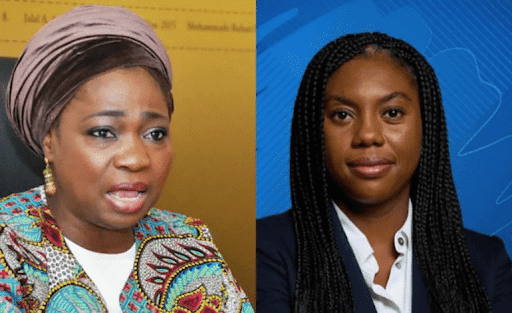Stop spreading lies about Nigeria - Dabiri-Erewa cautions Kemi Badenoch

```html Dabiri-Erewa Rebukes Kemi Badenoch Over "Misleading" Claims on Nigerian Citizenship Laws Abike Dabiri-Erewa, Chairman of the Nigerians in Diaspora Commission (NIDCOM), has publicly challenged recent statements made by Kemi Badenoch, a UK Conservative Party politician and current Secretary of State for Business and Trade, regarding Nigerian citizenship laws. Dabiri-Erewa characterized Badenoch's claims as "misleading" and "completely false," sparking a debate about diaspora representation and responsible public discourse.
Badenoch's Claims and NIDCOM's Response The controversy stems from an interview where Badenoch asserted that Nigerian law prevents her, as a woman, from passing citizenship to her children. This assertion triggered widespread reactions both within Nigeria and internationally. Dabiri-Erewa, responding on Channels Television's "Hard Copy" programme, refuted Badenoch's statement. She cited Section 25(1)(c) of the 1999 Nigerian Constitution, which explicitly grants citizenship to any child born outside Nigeria if either parent is Nigerian, regardless of gender. "But that is not true," Dabiri-Erewa stated emphatically. "Don’t go on international media and spread false information. That’s a lie, and people have responded."
Legal Perspectives and Expert Analysis Femi Falana, a prominent human rights lawyer and Senior Advocate of Nigeria (SAN), also weighed in on the matter, describing Badenoch's remarks as "a display of utter ignorance." Falana accused the UK official of misinforming the public and potentially leveraging inaccurate claims for political gain. “The Nigerian constitution is very clear on citizenship by birth,” explains Barrister Chima Ubani, a constitutional lawyer based in Lagos. “Section 25 explicitly removes any gender bias in the transmission of citizenship. Ms. Badenoch's statements contradict the established legal framework.” Ubani further adds that such pronouncements from individuals in positions of power can have damaging consequences, potentially misleading individuals about their rights and creating unnecessary confusion.
The Diaspora Dilemma: Representation and Responsibility The incident has reignited a broader discussion about the role and responsibility of diaspora figures when commenting on their country of origin. While acknowledging the right of Nigerians abroad to express their views, Dabiri-Erewa emphasized that spreading misinformation that damages Nigeria's image is unacceptable. "There are many Nigerians doing well in UK politics. We don’t have to focus on one person. But when you denigrate your country, we will respond," she stated.
Historical Context and Contemporary Implications Nigeria's citizenship laws have evolved over time, reflecting shifts in national identity and immigration policies. The 1999 Constitution, while progressive in its gender-neutral approach to citizenship by descent, is not without its complexities. The debate surrounding Badenoch's claims highlights the ongoing need for clarity and public awareness regarding citizenship rights, both within Nigeria and among its diaspora communities. Dr. Amina Sani, a political analyst specializing in diaspora relations, notes that "This situation underscores the delicate balance diaspora figures must strike between their adopted national identity and their connection to their heritage. While constructive criticism is essential for progress, misrepresenting facts can undermine trust and fuel negative stereotypes.” She further suggests that platforms like NIDCOM should actively engage in public education campaigns to disseminate accurate information about Nigerian laws and policies to the diaspora.
Moving Forward: Promoting Accurate Information and Constructive Dialogue The controversy surrounding Badenoch's remarks serves as a reminder of the importance of factual accuracy and responsible communication, particularly when discussing sensitive national issues on international platforms. It also highlights the need for ongoing dialogue between the Nigerian government and its diaspora communities to foster a more informed and constructive relationship.
```
Originally sourced from: pulse Ng
